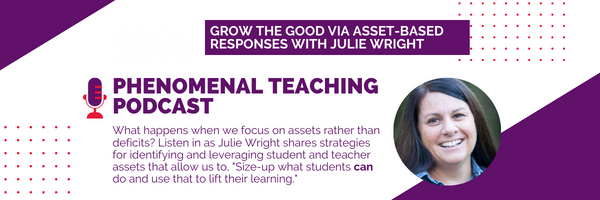What happens when we focus on assets rather than deficits? Listen in as Julie Wright shares strategies for “growing the good” with Michelle Morris Jones on PEBC’s Phenomenal Teaching Podcast. Identifying and leveraging student and teacher assets allows us to, “Size-up what students can do and use that to lift their learning.” This episode of the Phenomenal Teaching podcast connects to both the community and assessment strands of the PEBC Teaching Framework as well as the culture strand of the PEBC Leadership Framework.
Julie Wright believes that autonomy and agency thrive for children and adults when responses and interactions are efficient, effective and equitable. Julie is a traveling teacher, instructional coach, educational consultant, author, and a short texts-of-all-types enthusiast. You may know Julie through some of her writing, she is the co-author of What Are You Grouping For?, Grades 3-8: How to Guide Small Groups Based on Readers — Not the Book and author of What’s Our Response? Creating Systems and Structures to Support ALL Learners and Side-by-Side Instructional Coaching: 10 Asset-Based Habits that Spark Collaboration, Risk-Taking, and Growth. In her free time, Julie enjoys hiking with her family, tinkering in her garden, and is a wanna-be beekeeper. Click here for more resources.
The “Phenomenal Teaching Podcast” is brought to you by Public Education & Business Coalition (PEBC) and is intended to elevate the strands of the PEBC Teaching Framework illustrated in Wendy Ward Hoffer’s book, Phenomenal Teaching. Those strands include community, planning, workshop, thinking strategies, discourse, and assessment.





